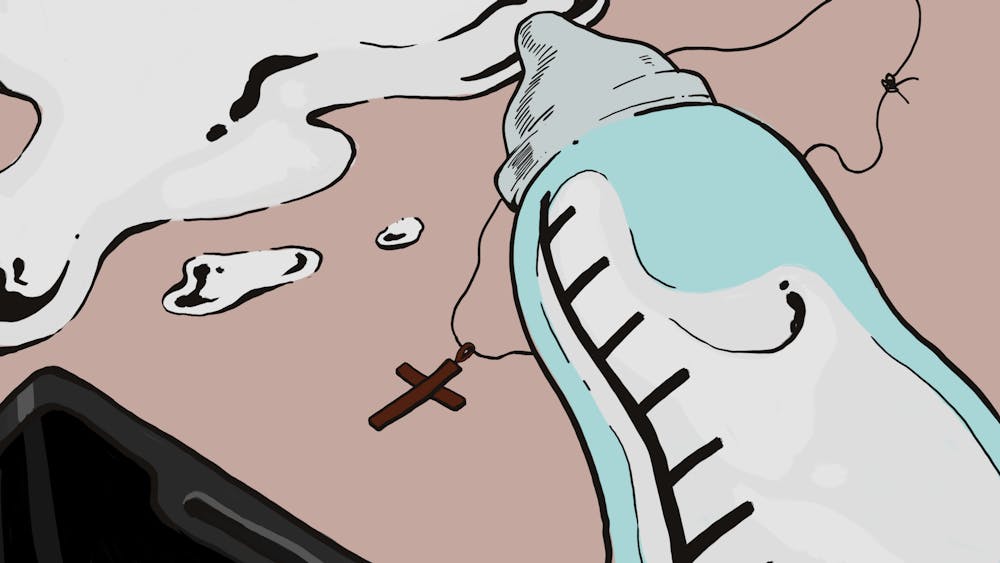The great state of Utah is known for two things: its large population of Mormons and its multi–million–dollar mommy blogging industry. These two defining characteristics combine to create #MomTok, a social media phenomenon composed of Mormon mommy bloggers that has captivated the internet in both its frivolity and its controversy. Yet, the aesthetically perfect, ethically questionable Mormon mommy blogging scene has erupted with news of “momfluencer” Taylor Paul’s recent divorce.
With approximately 3.5 million followers on TikTok as of May 2022, Paul is considered one of the central members of Utah’s MomTok scene. Known for posting videos with her equally polished momfluencer peers and aesthetic videos of blissful motherhood, she tempers her wholesome, family–oriented content with jokes about being “sisterwives” with members of her friend group and allusions to her and her husband possibly being related.
On May 23rd, Paul posted a cryptic TikTok video of her moving out of her home, saying that her “entire life [was] falling apart” and that she couldn’t even speak on it without “bringing [her friend group] all down with [her].” A couple days before this TikTok, Paul announced on her Instagram story that she and her husband, Tate Paul, were getting a divorce, stating that “The last 8 days have been the most pain [she’d] ever felt in [her] life.”
Soon after, social media sleuths speculated about the specifics of their divorce, claiming that Paul allegedly cheated on her husband with another Mormon mommy–blogger's husband.
Amidst these rumors, Paul went live on Instagram on May 25th, explaining that she and her husband were “soft–swingers” in a friend group with many other Mormon mommy–bloggers and their husbands. As “soft–swingers,” they were both intimate with people outside of their relationship but did not have sexual intercourse with them. She recounts that much of her divorce was due to the fact that she “stepped out of” her soft–swinging agreement with her husband and had sex with one of her friends’ husbands, both of whom were also involved in the soft–swinging group. “We played with fire and we got burnt,” Paul says.
In the live, she explains that within the mommy–blogging friend group, there are three other ongoing divorces—one of which is unrelated to the soft–swinging situation. But according to Paul, opening up their relationship wasn’t the only reason for her own divorce. “We had a lot of issues, and this was the tip of the iceberg,” she explains.
As the Mormon mommy meltdown develops, questions continue to arise about the mommy blogging industry and its relationship to the Church of Jesus Christ of the Latter–Day Saints.
According to the Toronto Star’s Katrina Clarke, the reason why the mommy blogging scene has such a large concentration of Mormons is because “various tenets of Mormonism—sharing the faith, the value of creativity and the importance of family—make the religion a perfect fit for the blogging medium.” Similarly, Clarke explains that Mormons have a strong tradition of journaling and documenting their lives. Thus, blogs are simply a modern extension of this tradition.
However, as Mormon mommy blogging enters TikTok’s mainstream, criticism has been raised regarding how social media stans consume this carefully curated emulation of reality—and the Mormon mommy meltdown highlights just that.
Paul and the rest of MomTok’s public feud has an entire subreddit dedicated to it. From tracking down the Pauls’ open house to starting threads speculating which members of MomTok could be involved in the swinging, the over 10,000 members of r/taylorpauldrama are frothing at the mouth for more information about the future of the MomTok friend group and their respective marriages. Some followers believe that this drama isn’t real and that it’s just a marketing ploy for a new Real Housewives–esque reality show set in Utah. But as this internet drama continues to have an incredibly tangible impact on the lives of Paul, her husband, and her friends, do our opinions as consumers of this meltdown even matter?
Regardless of the true motivations behind the very public unraveling of MomTok, this controversy reveals that in an attempt to live a so–called perfect life with perfect houses, perfect husbands, and perfect children, momfluencers create a sanitized, unrealistic depiction of motherhood that obscures what’s truly going on behind the scenes. The Mormon mommy meltdown uncovered a web of infidelity and erupted an entire friend group in front of the entire internet. In the process, the subtle but noticeable boundary between how we perceive reality TV characters and real–life human beings seems to become increasingly blurred.
As the MomTok drama plays out in real–time, it seems important to ask the following question: Where do we draw the line between the semi–scripted false “reality” of Real Housewives–esque TV and the aestheticized (but still real) lives of influencers?







